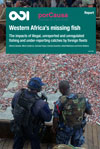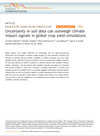-
Tracking Illegal Fishing in West Africa, and Improving Soil Data to Better Model Climate Effects
August 3, 2016 By Sreya Panuganti Overfishing by foreign fleets in West Africa is leading to devastating social and economic consequences. In a report from the Overseas Development Institute, an independent think tank based in London, researchers use satellite data to assess the scale of two kinds of illegal, unreported, and unregulated fishing: “reefers,” or large-scale commercial vessels receiving and freezing fish at sea and at port, and large refrigerated container ships that are registered in countries with less stringent enforcement regulations than that of the ship’s owners. Senegal lost nearly $300 million in 2012, or two percent of its gross domestic product to illegal fishing, according to the report. Sierra Leone is losing $29 million annually, equivalent to 10 percent of its education budget. Alfonso Daniels et al. urge African governments to improve transparency between regional partners through a comprehensive database and tracking system, strengthen controls at ports, ban blacklisted fishing vessels, push global actors to place container ships under the same reporting requirements as reefers and fishing vessels, and invest in indigenous processing industries and fishing fleets. Governments could generate $3.3 billion in revenue and create up to 300,000 new jobs, including 90,000 jobs for women, leading to a 10 percent increase in the total workforce in the fisheries sector.
Overfishing by foreign fleets in West Africa is leading to devastating social and economic consequences. In a report from the Overseas Development Institute, an independent think tank based in London, researchers use satellite data to assess the scale of two kinds of illegal, unreported, and unregulated fishing: “reefers,” or large-scale commercial vessels receiving and freezing fish at sea and at port, and large refrigerated container ships that are registered in countries with less stringent enforcement regulations than that of the ship’s owners. Senegal lost nearly $300 million in 2012, or two percent of its gross domestic product to illegal fishing, according to the report. Sierra Leone is losing $29 million annually, equivalent to 10 percent of its education budget. Alfonso Daniels et al. urge African governments to improve transparency between regional partners through a comprehensive database and tracking system, strengthen controls at ports, ban blacklisted fishing vessels, push global actors to place container ships under the same reporting requirements as reefers and fishing vessels, and invest in indigenous processing industries and fishing fleets. Governments could generate $3.3 billion in revenue and create up to 300,000 new jobs, including 90,000 jobs for women, leading to a 10 percent increase in the total workforce in the fisheries sector. Researchers typically use global gridded crop models as a way to assess climate change impacts on crop yield, or how much of a crop can be produced in a particular amount of space. These models consider factors such as climate, weather variability, irrigation, fertilizer, and, recently, soil type. A new study by Christian Folberth et al. in Nature Communications, illustrates the importance of soil type when determining how to adapt to climate change. “The dynamic interactions of soil texture, precipitation, and plant water requirement can result in unexpected climate change impact responses,” they write. If rainfall decreases, for example, crop yields in soils with lower water-storage capacity will be drained more rapidly compared to those soils with “finer texture” that can store water for longer periods. “The water and nutrient storage capacity of soils enables them to sustain crop growth during periods of adverse conditions and to either buffer or reinforce impacts of climate variability.” The authors suggest future iterations of this research to “increase coverage of soil samples” to further eliminate uncertainty in modeling.
Researchers typically use global gridded crop models as a way to assess climate change impacts on crop yield, or how much of a crop can be produced in a particular amount of space. These models consider factors such as climate, weather variability, irrigation, fertilizer, and, recently, soil type. A new study by Christian Folberth et al. in Nature Communications, illustrates the importance of soil type when determining how to adapt to climate change. “The dynamic interactions of soil texture, precipitation, and plant water requirement can result in unexpected climate change impact responses,” they write. If rainfall decreases, for example, crop yields in soils with lower water-storage capacity will be drained more rapidly compared to those soils with “finer texture” that can store water for longer periods. “The water and nutrient storage capacity of soils enables them to sustain crop growth during periods of adverse conditions and to either buffer or reinforce impacts of climate variability.” The authors suggest future iterations of this research to “increase coverage of soil samples” to further eliminate uncertainty in modeling.Sources: Nature Communications, The Overseas Development Institute.
 A Publication of the Stimson Center.
A Publication of the Stimson Center.





